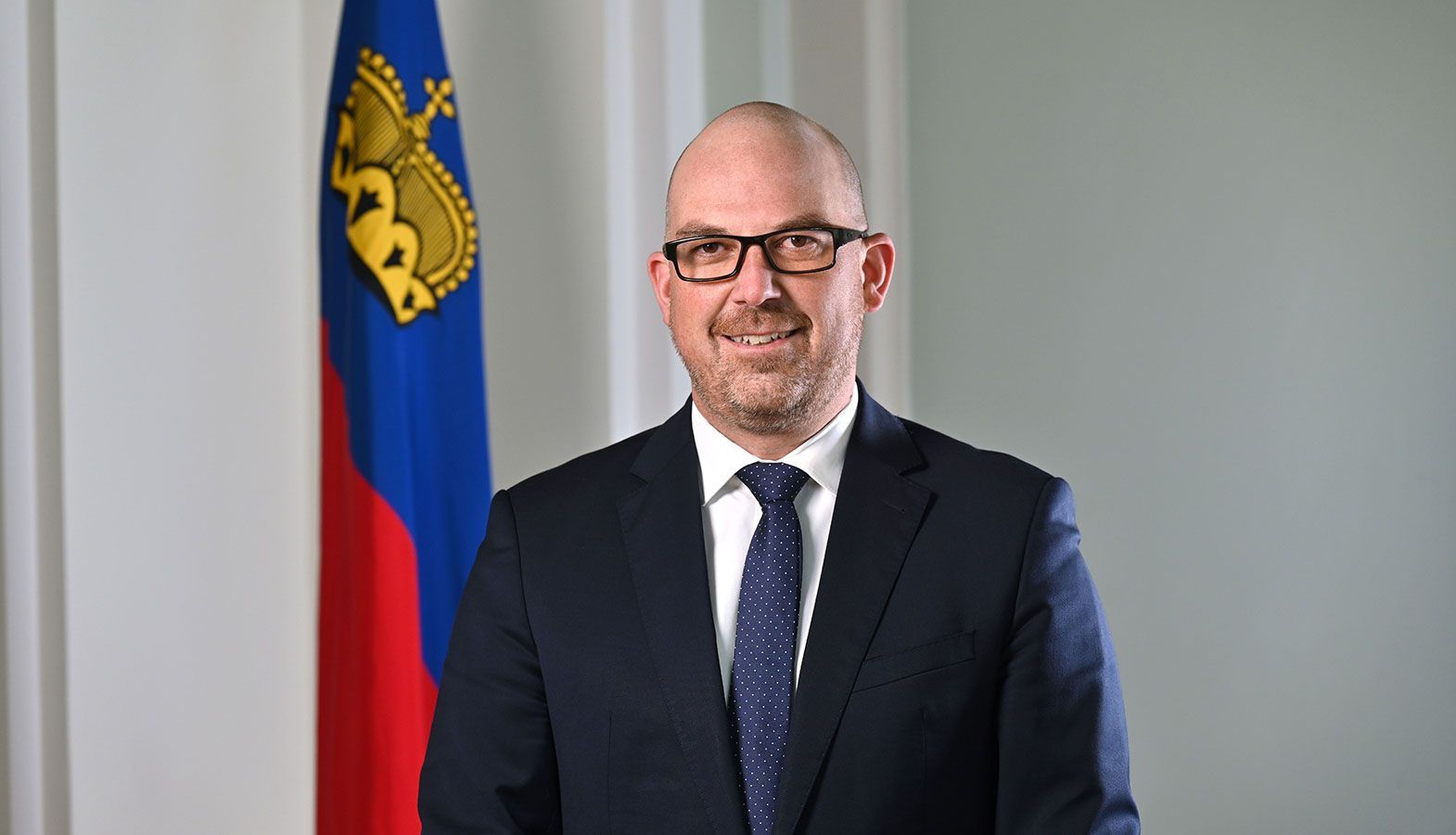Dr. Daniel Risch has served as the Prime Minister of Liechtenstein since March 25, 2021, overseeing the Ministry of General Government Affairs and Finance. He has been a member of the Party Executive Committee of the Vaterländische Union (VU) since 2016 and previously served on the Board of Directors of IKT Forum Liechtenstein.
Liechtenstein has one of the lowest crime rates globally and no military. How does your government maintain this high level of safety and security with such a small police force, and how do you collaborate with Austrian and Swiss authorities to ensure protection?
Back in the 1880s, we stopped having our own armed forces. [The military] was only 80 soldiers, and it wasn’t feasible to defend ourselves in conflict [this way]. Our constitution still holds male citizens responsible for defense, but we don’t have weapons, so it’s symbolic. Before 1923, we had a strong customs union with Austria, but after World War I, we shifted to a similar relationship with Switzerland. We now have customs and security cooperation with them. Liechtensteiners can serve in the Swiss army, though it’s voluntary. Our close relationship with Switzerland was a key reason Germany didn’t invade during World War II.
We’ve also maintained visibility through organizations like the UN and the Council of Europe, emphasizing that Liechtenstein is a sovereign state. Unlike other countries, our politicians, including myself, don't need security services; we can walk around freely, and people simply enjoy meeting us.
Switzerland has a significant influence on Liechtenstein’s culture, economy, and foreign policy. How do you view this relationship, and to what extent does Switzerland guide your country's decisions in these areas?
Historically, before 1995, Switzerland’s influence on us was very strong, especially [through] economic ties. However, culturally, Liechtenstein has its own identity. While there are influences from Switzerland, we also have Austrian influences and our own unique cultural heritage. Liechtenstein has existed as a sovereign state for over 300 years, so culturally, we’re distinct. In the 1990s, we made a major decision to join the European Economic Area (EEA), which includes the 27 EU member states, along with Iceland, Norway, and ourselves. This gave us access to the European single market.
We took a different path from Switzerland [on] European integration, and over the past 30 years, we’ve been investing heavily in our own foreign policy. While we have very strong historical ties to Switzerland, we've also been charting our own course in areas where we believe it’s beneficial.
While Liechtenstein is not an EU member, it collaborates closely with the European Union. Why is improving this collaboration and integration so important for your country? How does the EU benefit Liechtenstein, and conversely, what unique value does Liechtenstein contribute to the EU?
To understand this, you have to look at the structure of Liechtenstein’s economy. We have a very strong industrial sector, which makes up about 45 percent of our GDP. Some of our companies, like Hilti, which is famous for its drilling machines, are global leaders and need access to international markets. They need access to the EU, but also to the US and other global markets. On the other side, we also have a strong financial sector. Since our domestic market is so small—our population is only around 40,000—we rely on being closely integrated into the European single market. Through our membership in the EEA, we have access to the European market, and this is crucial for both our industrial and financial sectors.
Liechtenstein generally remains neutral on contentious geopolitical issues, yet your government has shown strong support for Ukraine in recent months. How do you balance neutrality with taking a stance on global conflicts, especially regarding Ukraine?
Actually, Liechtenstein is not officially neutral like Switzerland or Austria. We don’t have a formal declaration of neutrality. That said, we don’t have armed forces, so there’s a practical limitation on what we can do. When it comes to standing up for human rights and opposing aggression, we’ve always taken a clear stance.
This is what we’re doing now with Ukraine. Shortly after Russia’s invasion of Ukraine, Liechtenstein introduced a veto initiative at the United Nations. This initiative allows the General Assembly to convene within two weeks of a veto in the Security Council, ensuring that veto power is not the final word. This was strongly supported by many of our allies and has been adopted. It’s a small step toward improving how the UN functions, but it’s significant in that it provides more accountability.
Liechtenstein is a leader in financial services and technology, especially in blockchain and the token economy. What are some of the innovations your government is driving in these sectors, and what’s next for Liechtenstein in terms of financial technology?
We try to rule our country like a company. In 2016, our innovation department introduced the idea of token regulation, and we were one of the first countries to regulate tokens and blockchain-based assets. Since then, the EU has adopted similar regulations, and we worked closely with [EU member states] on this. Now, we have a level playing field, but we were definitely a front-runner in this area. We’re particularly interested in the next phase of blockchain, especially in the areas of intellectual property and smart contracts. These areas have the potential to revolutionize the way we handle intellectual property.
Liechtenstein’s legal framework for trusts and foundations is internationally known. Could you share how these structures continue to evolve and how they contribute to the country’s reputation as a financial hub?
We had to make significant changes after 2008 when we decided to move away from bank secrecy and clean up our financial sector. Over the last 15 years, we’ve worked hard to become a clean and well-regulated financial center. Our trusts and foundations are still very important for asset protection and philanthropy, and we’ve become known for our expertise in these areas. People are drawn to Liechtenstein not only because of the legal framework but also because of the stability of our policies. Our political system doesn’t change every few years, which gives investors confidence that they can trust our system.
Alpine tourism and winter sports play a role in Liechtenstein’s economy. How are you further developing this sector, and what innovations or strategies are being employed to attract more visitors and enhance the country’s appeal?
Alpine tourism is not a major part of our economy—it accounts for less than one percent of our GDP. While in Austria, for example, tourism plays a big role, in Liechtenstein, we only have a small ski resort. It’s a great resort, but it’s not significant economically. We do, however, occasionally win medals at the Winter Olympics, which is always a source of pride, but it’s not a key economic factor for us.
The Prince of Liechtenstein Foundation manages real estate, art collections, and investments outside Vaduz. How does the government navigate the balance between state and privately owned assets, and what role does the Foundation play in the national economy?
The Foundation doesn’t play a huge role in the national economy because most of its assets are outside Liechtenstein. However, both the princely family and the government share a very entrepreneurial mindset. We believe in low taxes and minimal government intervention, allowing businesses and individuals to thrive with little interference. This entrepreneurial spirit is a core part of both the government’s and the princely family’s approach to managing assets. It’s in our DNA to be self-reliant, while also ensuring that we have strong social systems in place for those who need them.
The Liechtenstein Institute on Self-Determination at Princeton University focuses on global governance and self-determination. What do you hope to achieve through this initiative, and how does it reflect Liechtenstein’s broader contributions to international diplomacy?
The Liechtenstein Institute on Self-Determination at Princeton was founded and is funded by the princely family. It aligns with our strong belief in self-determination, not only for individuals but also for nations. The institute focuses on governance and how smaller or emerging entities can achieve self-determination while maintaining a strong, independent voice in global affairs. It’s an extension of our broader contributions to international diplomacy, reflecting our values and helping to promote these principles on the world stage. The institute has done an incredible job, and because it bears the name of our princely family and country, it also enhances Liechtenstein’s visibility and influence in global discussions.
Ohrenstein spoke with Dr. Risch on September 18th, 2024. This interview has been lightly edited for length and clarity.
The views expressed in this piece are the interviewee's own and are not reflective of the views of the HIR, its members, its subscribers, or its editorial staff.





